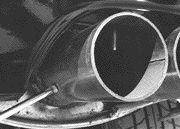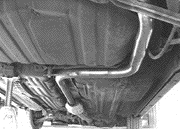
Story and Photos by Vic Jacko
This article was originally posted at the GRM Homepage
Clearly the most bang for your
performance buck in the horsepower and torque race is to get rid of
the engine exhaust gases in an efficient manner. Problem is that many
aftermarket performance mufflers or exhaust systems will drive you up
the wall on a long trip with their constant droning.
However, now you can have it both
ways: reasonably quiet stock sound for normal street and highway
driving, and straight-through performance for the drag strip or
autocross that still meets all noise level requirements. How? Read
on, McDuff!
STAGE ONE
Replace the heavy stock muffler with a
large diameter "turbo" muffler that has been slightly
modified. The anatomy of a typical reverse-flow stock muffler is shown
in Figure A (next page). Note the gases must negotiate at least two
180-degree turns within the confines of the muffler's expansion
chamber.
Figure B on page 48 depicts a
modification to the muffler which allows gases to vacate directly out
the tailpipe in a straight line. Now I ask you, if you were one of the
hot little molecules of exhaust gas, which route would you rather
take?
Now let's look at the photos on page
48. Photo 1 shows the donor muffler before minor surgery was performed
to attach the additional outlet. (Checker p/n 17715, Dynomax
21/2" inlet, 21/2" outlet-about $15.00) Photo 2 depicts the
21/2" plug with pullout hook attached. Photo 3 shows how simple
it is to secure the plug with a single screw for normal day-to-day
driving.
If you're concerned about the legality
of this modification, SCCA Solo II Stock rules allow that any or all
parts of the exhaust system from the catalytic converter to the rear
of the vehicle can be changed or modified.
STAGE TWO
Rather than attaching the modified
muffler that we built to a small-diameter stock tailpipe, we should
consider going all the way and increase the cross section of the
plumbing with a "cat-back" system. (See Photo 4.)
The car for this project was a Nissan
NX 2000, which comes from the factory with a 13/4" tailpipe and a
very heavy muffler and resonator. We had our local muffler shop bend a
new duplicate pipe of 21/2" diameter. Crunch the geometry
numbers and you will see that we doubled the effective cross section
by adding only 3/4" to the pipe size.
Unless your muffler shop has access to
a mandrel bending machine which maintains constant pipe size, you may
have to sacrifice a little efficiency due to the slight restrictions
your muffler shop bends into your new tailpipe. Not to worry; your
original pipe had the same restrictions. The larger diameter will
easily make up for these minor restrictions. The rear flange of the
catalytic converter of the NX2000 has a 21/2" outlet. You can
use a standard 21/2" flange blank to weld to your new tailpipe.
Bending the new tailpipe, obtaining short pieces to modify the muffler
and a 21/2" flange cost $40.00. With my trusty Miller MIG welder
I put it all together in about two hours. The original muffler hangers
were used to support the new system. How does it work? Great sound for
street use and highway travel and straight-through performance for the
track. What more could you ask? Have a nice "quiet" day.

Photo 1 |

Photo 2 |

Photo 3 |

Photo 4 |
|





